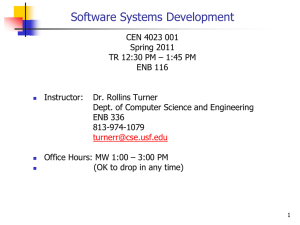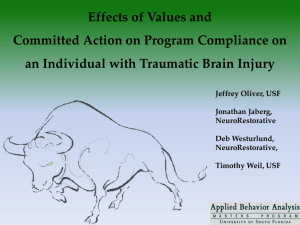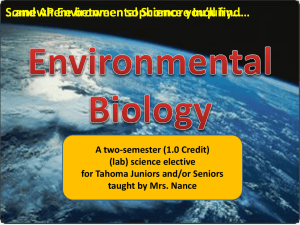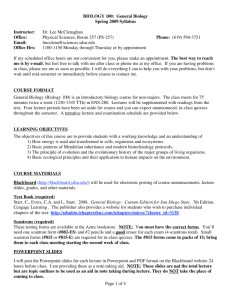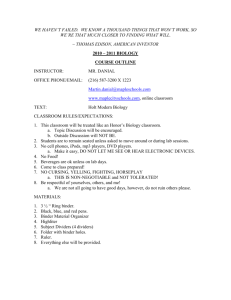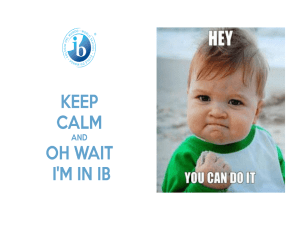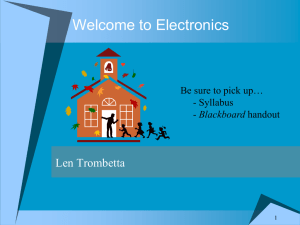General Biology II - University of South Florida
advertisement
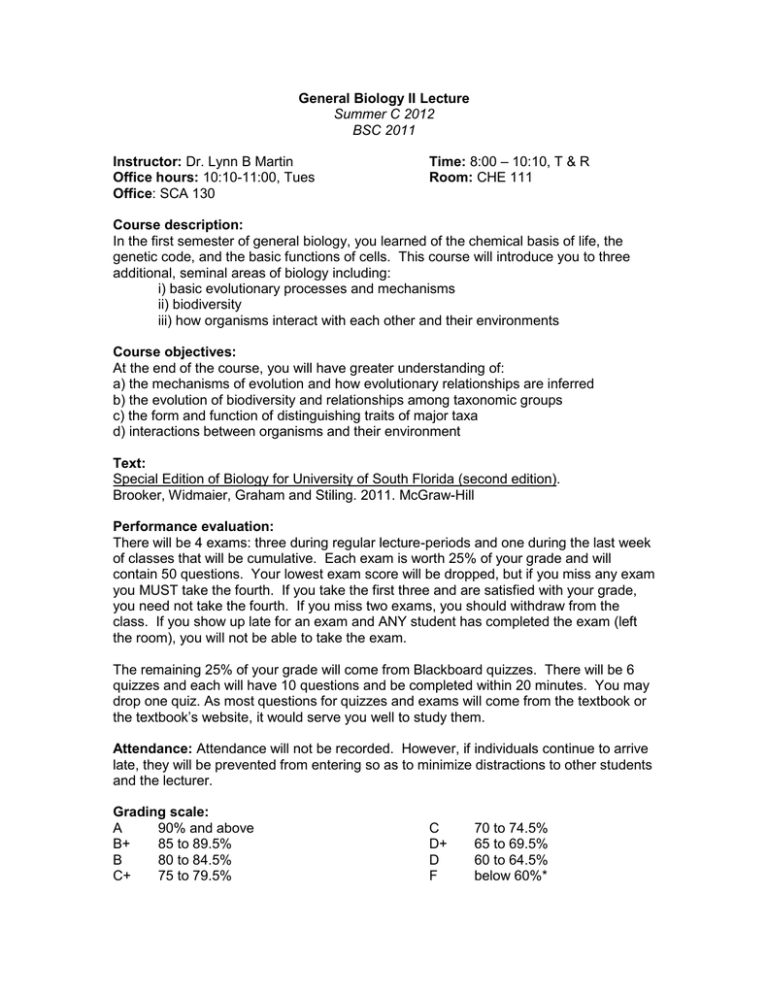
General Biology II Lecture Summer C 2012 BSC 2011 Instructor: Dr. Lynn B Martin Office hours: 10:10-11:00, Tues Office: SCA 130 Time: 8:00 – 10:10, T & R Room: CHE 111 Course description: In the first semester of general biology, you learned of the chemical basis of life, the genetic code, and the basic functions of cells. This course will introduce you to three additional, seminal areas of biology including: i) basic evolutionary processes and mechanisms ii) biodiversity iii) how organisms interact with each other and their environments Course objectives: At the end of the course, you will have greater understanding of: a) the mechanisms of evolution and how evolutionary relationships are inferred b) the evolution of biodiversity and relationships among taxonomic groups c) the form and function of distinguishing traits of major taxa d) interactions between organisms and their environment Text: Special Edition of Biology for University of South Florida (second edition). Brooker, Widmaier, Graham and Stiling. 2011. McGraw-Hill Performance evaluation: There will be 4 exams: three during regular lecture-periods and one during the last week of classes that will be cumulative. Each exam is worth 25% of your grade and will contain 50 questions. Your lowest exam score will be dropped, but if you miss any exam you MUST take the fourth. If you take the first three and are satisfied with your grade, you need not take the fourth. If you miss two exams, you should withdraw from the class. If you show up late for an exam and ANY student has completed the exam (left the room), you will not be able to take the exam. The remaining 25% of your grade will come from Blackboard quizzes. There will be 6 quizzes and each will have 10 questions and be completed within 20 minutes. You may drop one quiz. As most questions for quizzes and exams will come from the textbook or the textbook’s website, it would serve you well to study them. Attendance: Attendance will not be recorded. However, if individuals continue to arrive late, they will be prevented from entering so as to minimize distractions to other students and the lecturer. Grading scale: A 90% and above B+ 85 to 89.5% B 80 to 84.5% C+ 75 to 79.5% C D+ D F 70 to 74.5% 65 to 69.5% 60 to 64.5% below 60%* *F also assigned for serious academic misconduct (see below) No extra credit will be given and grades will NOT be curved. Web page: BlackBoard will be used to post outlines of lecture notes, communicate assignments, and post grades. Become familiar with this system if you haven’t already (http://my.usf.edu). Other important notes: 1. Assigned readings: you should read the chapters below BEFORE attending class. This way, you will better understand the lecture and make studying easier for yourself. 2. Electronic versions of PowerPoint presentations will be available on Blackboard. However, you will likely need to make additional notes during lecture to perform well on exams and quizzes. 3. The content of the course is the sole property of the instructor and may not be reproduced or distributed in any form for sale. 4. Exam and lecture dates and content are tentative so your attendance is critical to learn of impending changes. 5. An “I” grade may only be awarded when only a small portion of coursework is incomplete and when the student otherwise has a passing grade. A Biology department “Incomplete Grade Contract” must be completed before the “I” grade is given. 6. No cell phones, PDAs or other electronic devices (besides a laptop for taking notes) are allowed in the classroom. Any use of a laptop besides note-taking is grounds for dismissal from the class that day; second offenses will result in permanent dismissal. Any use of cell phones or other communication devices will have the same consequences. 7. Disruption of academic process is an act by a student in a classroom or teaching environment which in the reasonable estimation of a faculty member: i) distracts attention from the academic material (e.g., persistent, disrespectful or abusive disruptions), or ii: presents danger to the health, safety or well-being of class participants. This includes excessive tardiness, leaving early, or talking excessively with classmates. 8. Uncollected assignments will not be retained longer than 90 days from the due date. Grades cannot be disputed beyond 90 days from their assignment. 9. Academic dishonesty will not be tolerated and you will be held to all academic policies and standards of the USF (see below). Should I find evidence of cheating on any assignment, the student will receive an F in the course. If the offense is serious, charges will be brought to the Dean of Arts and Sciences, and punishment may include a punitive F, which cannot be stricken from the student’s record. 10. BSC 2011 lab is operated separately from the lecture, although efforts have been made to ensure material is complementary. If you have a concern, discuss it with your TA first. I will get involved only after you have tried to reconcile your problem with your TA. You must be enrolled in lecture to remain in lab however; if you withdraw from lecture, you must withdraw from lab too. 11. You MUST bring USF ID or Driver’s License to all tests. ID’s may be checked at the beginning or end of class to ensure that you are enrolled in the class. Hats must be work backwards during exam, or ideally removed. NO electronic devices of any kind may be used during exams. You should not make any large or obvious marks on the test form, so as to minimize my concern or that of exam proctors that you are attempting to communicate answers to your classmates. 12. You are held to all of the guidelines of USF Integrative Biology, which can be found here: http://biology.usf.edu/ib/admin/. Last day to drop and be eligible for a ‘W’ in the class is June 30, 2012. Week 1 2 3 4 5 6 7 8 9 10 Date May 15 May 17 May 22 May 24 May 29 May 31 June 5 June 7 June 12 June 14 June 19 June 21 June 26 June 28 July 3 July 5 July 10 July 12 July 17 July 19 Day T R T R T R T R T R T R T R T R T R T R TENTATIVE SCHEDULE Readings Topic 22 Syllabus; History of life 23 Intro to evolution 24 Population genetics 25 Origin of species 26 Taxonomy and systematics 27 Bacteria and Archaea EXAM 1 28 Protists 30 Plants and land colonization 31 Plant diversity 32 Animal diversity 33 Invertebrates EXAM 2 34 Vertebrates 54 Introduction to ecology 55 Behavioral ecology 56 Population ecology 58 Community ecology EXAM 3 FINAL EXAM Quizzes 1 2 3 4 5 6 Dishonesty Policy: USF expects all members to behave with academic integrity. Should we find evidence of academic misconduct (cheating, or complicity in academic dishonesty) by a student, we will inform the student of the action to be taken. Cheating on an exam will result in a grade of F for the course. If the offense is extremely serious, charges against the student will be brought before the Dean of the College of Arts and Sciences. This can include a punitive F that cannot be "forgiven" from the records.
